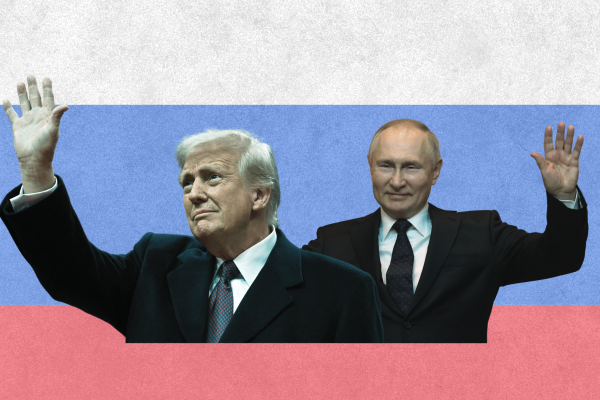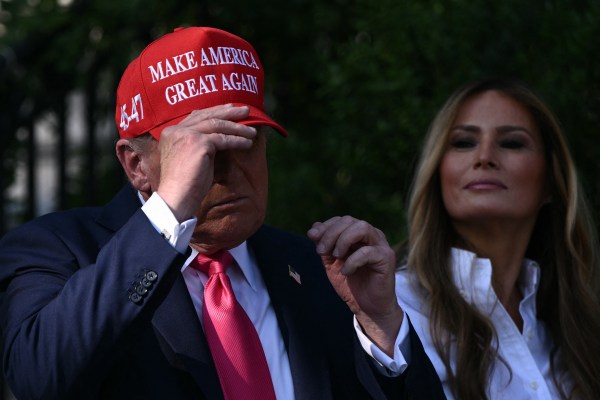Many in professional Washington and the media were shocked this week when the president of the United States began parroting Kremlin talking points and castigating Ukrainian President Volodymyr Zelensky as a “dictator.” But to understand this origin story, you only have to look at the events of the summer of 2019 and the circumstances leading to the first impeachment of Donald Trump.
“He never recovered from the consequences of the ‘perfect’ phone call,” John Bolton, Donald Trump’s former national security adviser, told The Dispatch.
That would be Trump’s July 25, 2019, phone call with Zelensky, just two months after Zelensky came into office. During that call, Trump pressed Zelensky to investigate former Vice President Joe Biden and his son Hunter, all while Trump’s administration had placed a hold on congressionally mandated military aid to Ukraine. This call followed weeks of pressure from Trump allies both privately and publicly trying to get the Ukrainian government to announce an investigation into the Bidens or other Democrats like Hillary Clinton.
The military aid to Ukraine was lifted only after a whistleblower had made a complaint about the July 25 phone call, the news of which started the process that would lead to the House impeaching Trump for abusing power and obstructing Congress. (The Senate would go on to acquit him.) Zelensky never announced nor did his government pursue any additional investigations.
Trump never let go of his grievance against Zelensky and Ukraine, even holding on to the idea (later deemed the product of Russian-backed propaganda) that the Ukrainian government had interfered in the 2016 election against Trump’s campaign.
“He would still talk even after that,” said Bolton, who resigned from the White House in September 2019 just before the House began its formal inquiry. “Before I left, I knew he talked about it, and others told me later, he still did. ‘Where’s Hillary Clinton’s server in Ukraine?’ … ‘Why did they campaign against me in 2016?’ … “Why are they, you know, setting up to do the same in 2020 now?’”
“It was all paranoia, but that’s what he thought,” Bolton added.
This personal animus for Zelensky—and admiration for Russian strongman Vladimir Putin—undergirds Trump’s recent comments and his administration’s actions toward the war-torn nation of Ukraine. And while there are either those in the administration or supportive of the president who have constructed justifications for the United States to effectively switch sides in the Russia-Ukraine war, they mostly serve to provide more heft to Trump’s own surface-level foreign policy of leader-to-leader diplomacy.
“Trump says publicly—he’s said it privately any number of times—that he believes that relations between states really depend on the relations between the heads of government. So if he has a good relationship with Vladimir Putin, in his mind, then the U.S. has good relations with Russia,” Bolton said. “Now, you know you can never discount the importance of personal relations, including in foreign policy, but ultimately, foreign policy is driven by the interests of states, not personalities.”
Is that really the case anymore? It’s true that several Republicans in Washington and beyond have expressed their disagreements with Trump on Ukraine in a manner not seen yet in the new president’s term until this week. That’s a low bar, to be sure, but their sharp criticism of Putin (and implied criticism of Trump) sticks out.
There was Sen. Roger Wicker, the chairman of the Armed Services Committee, who was blunt about Trump’s effort to negotiate an end to the war with Russia’s leader: “Putin is a war criminal who should be in jail for the rest of his life, if not executed.” Both Sens. John Cornyn and John Kennedy, who have supported funding for Ukraine, delicately distanced themselves from the president’s declaration this week that Zelensky is a dictator. And Rep. Don Bacon, the swing-district Republican from Nebraska, was even more open about his disagreement with Trump on Zelensky: “I want to be very strong in my words today, because this Republican does not agree with what the president said.”
But there are just as many, if not more, Republicans on Capitol Hill who are proudly standing with Trump, praising the president for “negotiating for peace” with Russia and siding with his criticism of Zelensky.
And on top of that, there’s nothing to indicate Republicans who are alarmed by Trump’s bromance with Putin at the expense of Ukraine’s sovereignty are ready to, well, do anything about it. What is more likely is a continued backfilling of Trump’s words and actions in the manner of Sen. Lindsey Graham, a longtime supporter of the Ukraine cause who remains a staunch, unwavering ally of Trump.
“If history has taught us anything it’s that appeasing aggression gets you more aggression. ” Graham tweeted Wednesday, the day after Trump claimed Ukraine started the war that in fact began with Russia’s invasion three years ago. “That was Chamberlain to Hitler and Biden and Obama to Putin. I am confident that President Trump will end the Ukraine war quickly and in a fashion that will deter future aggression.”
The cognitive dissonance of Graham’s statement suggests the GOP’s remaining hawks are at a loss for how to square their principles and policy chops with the circle of Trump’s personality-driven approach.
“It’s very hard for people to understand. It’s hard for me to understand. He does not think in policy terms, it’s not what motivates him,” said Bolton. “I don’t think he understands it.”










Please note that we at The Dispatch hold ourselves, our work, and our commenters to a higher standard than other places on the internet. We welcome comments that foster genuine debate or discussion—including comments critical of us or our work—but responses that include ad hominem attacks on fellow Dispatch members or are intended to stoke fear and anger may be moderated.
With your membership, you only have the ability to comment on The Morning Dispatch articles. Consider upgrading to join the conversation everywhere.